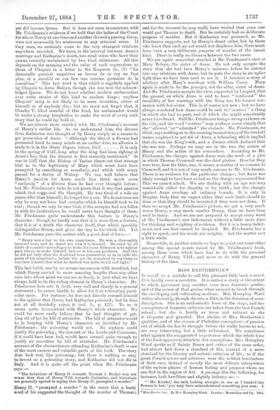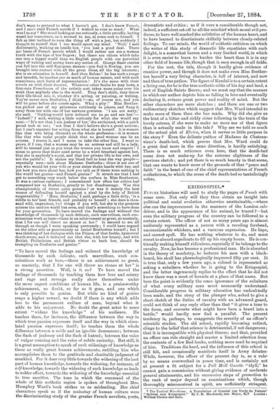MISS BRETIIERTON.*
IT would be a mistake to call this pleasant little book a novel. It is hardly even a novelette. It is rather a study of the extent to which ignorance may smother even true dramatic genius, and of the power of that genius when aroused to break through the enveloping and suffocating medium. Mrs. Humphry Ward writes admirably, though she errs a little in the direction of over- description. She is an enthusiastic lover of the stage, and her conceptions of dramatic criticism are taken from the best French school ; but she is hardly as terse and reticent as she is eloquent and graceful. Her studies of Miss Brethertoes qualities, and of the cocoon of Philistine conceptions of passion out of which she has to struggle before she really learns to act, are very interesting, but a little redundant. We sometimes rebel against the exaggerated importance which the whole tone of the book appears to attach to Art conceptions. Mrs. Humphry Ward speaks as if Sainte Beuve and critics of the same order, had almost laid down a standard of life, instead of a mere standard for the literary and artistic criticism of life; as if the great French actors and actresses were the noblest benefactors of their race, instead of merely the most delicate interpreters of the various phases of human feeling and purpose whom we can find in the region of Art. A passage like the following, for instance, both bewilders and slightly irritates us :- "' Mr. Kendal,' she said, looking straight at me as I handed the flowers to her, 'you may have misunderstood something just now. I • Miss Brethe,ton. By Mrs. Humphry Ward. Loudon : Macmillan and Co. 1881.
don't want to pretend to what I haven't got. I don't know French, and I can't read French novels if I wished to ever so much.' What was I to say ? She stood looking at me seriously, a little proudly, having eased her conscience, as it seemed to me, at some cost to herself. 'I felt at first inclined to turn the thing off with a jest, but suddenly I thought to myself that I too would speak my mind. Well,' I said deliberately, walking on beside her, ' you lose a good deal. There are hosts of French novels which I would rather not see a woman touch with the tips of her fingers; • but there are others which take one into a bigger world than we English people with our parochial ways of writing and seeing have any notion of. George Sand carries you fall into the mid-European stream—you feel it flowing, you are brought into contact with all the great ideas, all the big interests ; she is an education in herself. And then Balzac ! he has such a range and breadth, he teaches one so much of human nature, and with such conscience, such force of representation ! It's the same with their novels as with their theatre. Whatever other faults he may have, a first-rate Frenchman of the artistic sort takes more pains over his work than anybody else in the world. They don't shirk, they throw their life-blood into it, whether it's acting, or painting, or writing. You've never seen Desforets, I think ?—no, of course not, and you will be gone before she comes again. What a pity !' Miss Brether- ton picked one of my primroses ruthlessly to pieces, and flung it away from her with one of her nervous gestures. ' I am not sorry,' she said. Nothing would have induced me to go and see her.' Indeed !' I said, waiting a little curiously for what she would say next.—' It's not that I am jealous of her,' she exclaimed, with a quick proud look at me ; not that I don't believe she's a great actress ; but I can't separate her acting from what she is herself. It is women like that who bring discredit on the whole profession—it is women like that who make people think that no good woman can be an actress. I resent it, and I mean to take the other line. I want to prove, if I can, that a woman may be an actress and still be a lady, still be treated just as you treat the women you know and respect ! I mean to prove that there need never be a word breathed against her, that she is anybody's equal, and that her private life is her own, and not the public's ! It makes my blood boil to bear the way people— especially men—talk about Madame Desforets ; there is not one of you who would let your wife or your sister shake hands with her, and yet how you rave about her, how you talk as if there were nothing in the world but genius—and French genius !' It struck me that I had got to something very much below the surface iu Miss Bretherton. It was a curious outburst ; I remembered how often her critics had compared her to Desforets, greatly to her disadvantage. Was this championship of virtue quite genuine ? or was it merely the best means of defending herself against a rival by the help of British
respectability ? Mine. Desforets,' I said, perhaps a little drily, is a riddle to her best friends, and probably to herself ; she does a thou- sand wild, imprudent, bad things if you will, but she is the greatest actress the modern world has seen, and that's something to have done for your generation. To have moved the feelings and widened the knowledge of thousands by such delicate, such marvellous, such con- scientious work as hers—there is an achievement so great, so masterly, that I for one will throw no stones at her!' It seemed to me all through as though I were speaking perversely ; I could have argued on the other side as passionately as Isabel Bretherton herself ; but I was thinking of her dialogue with the Prince, of that feeble, hysterical death-scene, and it irritated me that she, with her beauty, and with British Philistinism and British virtue to back her, should be trampling on Desforets and genius."
"To have moved the feelings and widened the knowledge of thousands by such delicate, such marvellous, such con- scientious work as hers,—there is an achievement so great, so masterly, that I for one will throw no stones at her " is a strong assertion. Well, is it so ? To have moved the feelings of thousands by teaching them how love and misery and rage and revenge really show themselves under the more urgent conditions of human life, is a praiseworthy achievement, no doubt, so far as it goes, and one which is only possible to genius. But while no kind of genius reaps a higher reward, we doubt if there is any which adds less to the permanent welfare of man, beyond what it adds to his enjoyment. No doubt the great actor to some extent " widens the knowledge " of his audience. He teaches them, for instance, the difference between the way in which true passion expresses itself and the way in which simu- lated passion expresses itself; he teaches them the whole difference between a noble and an ignoble demeanour; between the flash of jealousy and the flash of hatred ; between the voice of vulgar cunning and the voice of subtle curiosity. But still, it is a great assumption to speak of such widenings of knowledge as these as really great human achievements, entitling him who accomplishes them to the gratitude and charitable judgment of mankind. For it does very little towards the widening of the best part of human knowledge, towards the widening, for instance, of self-knowledge, towards the widening of such knowledge as leads to nobler effort, towards the widening of the knowledge essential to true sacrifice. The tone in which the command of the whole of this resthetic region is spoken of throughout Mrs. Humphry Ward's book strikes us as misleading. Her chief characters speak as if the mainstay of human culture were the discriminating study of the greater French novelists, poets, dramatists and critics ; as if it were a considerable though not, indeed, a sufficient set-off to all the mischief which moral evil pro. duces, to have well marked the subtleties of the human heart, and to have learned to discriminate skilfully between closely-related feelings. To our minds, the world of resthetic criticism on which the writer of this study of dramatic life expatiates with such delight, is a somewhat barren and a very limited world, in which it is even easier to learn to harden the heart than it is in any other field of human life, though that is easy enough in all fields.
For the rest, the tale, though it hardly gives evidence of creative power, and though it does not make even Miss Brether- ton herself a very living character, is full of interest, and now and then of true pathos. The figure of Kendal is to a certain extent a living one, for he is the true aathetic critic of his day and land, a sort of English Sainte Beuve; and we must say that the manner in which our author depicts him as falling in love and eventually declaring it, evinces great power and reality of mind. But the other characters are mere sketches ; and there are one or two rudimentary sketches which suggest that Mrs. Ward intended to make more of them than she has made. Why did she give us the hint of a bitter and sickly sister following in the train of the lovely actress, if she were to make no more use of that figure than is actually made in this tale ? Why are we told so much of the actual plot of Elvira, when it serves so little purpose in the story ? Even the delicate pathos of Madame de Chateau- vieux's death-bed, which proves that Mrs. Ward could do a great deal more in the same direction, is hardly satisfying. There is so much reticence even here, that the death-bed scene does not make-up for the extreme slightness of the previous sketch ; and yet there is so much beauty in that scene, that one wants to know more of the grounds of that "peace and faith" in the heart of one of the chief representatives of French aestheticism, to which the scene of the death-bed so tantalisingly refers.



































 Previous page
Previous page